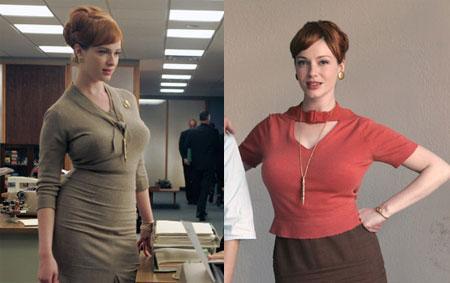
Is celebrating celebrities like Christina Hendricks really radical?
I recently came across a great article over at Healthy Is The New Skinny. I love it not just because it celebrates Christina Hendricks as one of the few contemporary celebrities who has healthy amounts of flesh on their bones as standard (not just ‘for a role’ or because they’re in some sort of emotional meltdown….can’t blame the latter really), but, in contrast, because it also succinctly exemplifies the quagmire of public discourse around female bodies. The article is cited from NY Daily News, but it popped up in my newsfeed from Healthy is the New Skinny, which is a “multi-platform movement to bring a message of health, joy and responsibility to the beauty and the fashion industries.” I was happy to come across this blog and I think their efforts and outlook should be applauded. Mostly.
Initially, it feels bloody fantastic every time a site or organization such as this catches my eye. But then the secondary weariness kicks in: weariness based on the fact that promoting health, diversity and acceptance over self-denial, self-deprecation, and cruel uniformity is still something to get excited about, that it’s not the norm. You may not agree, since there has been such an increase in contemporary public discussion about mainstream representations of women and girls. But read that article about Christina Hendricks again, and ask yourself exactly how radical its expressions are, particularly in its second half.
I feel this frustration so often. An article, organization, etc. concerned with improving female body image comes to my attention which veers in some way from the usual ”Lose 10 Pounds In A Week” variety and instead assumes a progressive and radical furthering of The Feminist Agenda and the self-esteem of women internationally by promoting a “Love Your Body” campaign. Progressive, they may be, but radical? Nah.
Often the messages “Love Your Body” and “Love Yourself” are interchangeable, the implication is that females are equivalent to their exterior. It’s merely the parameters of permissible sizes that have changed. The game’s the same, but the goalposts have widened. It’s a far cry from radical.
Here lies an interesting, and often completely overlooked, debate. It is undeniably important to promote self-acceptance, bodily or otherwise, especially in young children. For example, I initially learned my gender ‘norms’ from Disney, which we know is problematic. The hegemonic, homogenous representations of gender in culture combined with its teachings of self-denial and inadequacy (see: most advertising) subconsciously shackle us in many respects, certainly in the belief that we must make up for our gender-specific failings. So, if culture produces a neurotic tendency to self-deny that we must work against in order to self-accept, then those that tell us to love ourselves and love our bodies do so quite rightly. And to an extent, I champion them. I’m sure the vast majority of people, especially in this grouping, very much believe that they are doing the right thing. It’s the ‘no matter what it looks like’ part that is troubling.
The focus of discussion, (occasionally for men, always for women) is still on appearance and ‘beauty’, whether the tone of discussion is positive or not. Yes, being overweight to the extent that it makes you feel ill or will shorten your life span is ‘bad’, assuming you’d like to have an enjoyable, long life. But the message here is that beauty is indeed a quantifiable ‘thing’, that ideally we (women) should ‘be’ or strive to ‘be it’, and that even if we don’t attain such glorious heights of achievement by nature or effort, we should love our bodies in spite of it.
The reason we should love ourselves and our bodies is simply because we are. We exist, alongside family and friends who love us, rely on us, and need us to be well. I think as humans we have innate worth and we should Love Our Bodies (and equally importantly, our MINDS) because if we don’t love them, if we abuse them with restrictive diets, over-exercising, self-deprecation, or neglect their needs in any way (including the restriction of nutritious food in favour of processed), then they will deteriorate. Fast. And that means missing out on life. And life is all we have.
I am reticent to take away from efforts like Healthy Is The New Skinny because as a young woman who feels the full force of pressures to punish myself down to the uniform standard, I cling to them for support and affirmation when I’m struggling. But criticism is healthy, as long as it’s constructive, and I feel we can all agree — let’s worry more about the health and experience of our bodies than their appearance.
(I also encourage everyone to read Susan Bordo’s Unbearable Weight: Feminism, Western Culture and the Body, in full. But particularly page 5 of the introduction, Woman as Body, which helped me order my thoughts from frustrated intuition to demonstrable position.)

